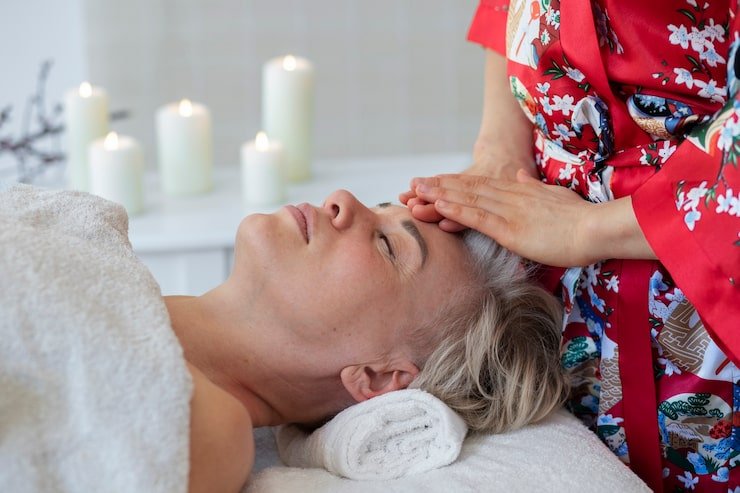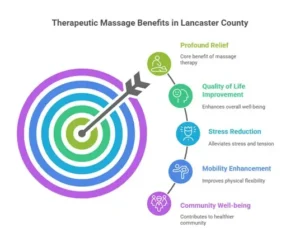Stress affects every aspect of your health, from how well you sleep to how often you get sick. While you probably recognize when you’re feeling stressed, you might not realize how chronic tension manifests physically in your body. Massage therapy offers measurable benefits for stress reduction, working through both physical and neurological pathways to restore balance. Here are five compelling reasons to book your appointment.
1. Physical Tension Release
When you’re stressed, your muscles tense up. It’s part of your body’s fight-or-flight response. The problem is that during chronic stress, those muscles never fully relax. That shoulder tension you carry all day? The tight jaw you clench during difficult meetings? These are real physical patterns that create persistent discomfort.
Your shoulders, neck, and jaw commonly hold stress-related tension. You unconsciously raise your shoulders, clench your jaw, or tighten your neck muscles throughout the day. This sustained contraction restricts blood flow and creates trigger points, hyperirritable spots in muscle tissue that refer pain to other areas.
Your lower back often develops tension from both physical posture and emotional stress. The psoas muscle, which connects your spine to your legs, is particularly sensitive to stress and anxiety.
Manual therapy directly addresses muscle tension by applying pressure that encourages muscles to release their habitual contraction patterns. As your therapist works through tight areas, blood flow increases, bringing oxygen and nutrients while removing waste products. The mechanical pressure stimulates receptors in your skin and muscles that send signals to your brain, often overriding pain signals and providing immediate relief.
2. Nervous System Regulation
Stress activates your sympathetic nervous system, the part that prepares your body for action. When this system stays chronically activated, you experience elevated heart rate, increased blood pressure, and heightened alertness. You’re essentially stuck in emergency mode.
Massage therapy stimulates your parasympathetic nervous system, which controls rest and digestion. When this system becomes active, your heart rate and blood pressure decrease. Your breathing naturally deepens and slows. This physiological shift is the opposite of the stress response.
Massage triggers the release of neurotransmitters including serotonin and dopamine, which regulate mood and create feelings of wellbeing. At the same time, cortisol levels decrease. Cortisol is your primary stress hormone, and increased levels contribute to weight gain, sleep problems, and weakened immunity.
Regular massage sessions help retrain your nervous system to spend more time in a relaxed state. People who receive consistent massage often report feeling calmer in their daily lives, not just during sessions.
3. Improved Sleep Quality
Stress and poor sleep create a vicious cycle. Stress interferes with sleep, and lack of sleep makes your body less able to handle stress. Massage therapy interrupts this cycle by addressing both the physical tension and the neurological patterns that interfere with rest.
When cortisol levels remain high, falling asleep becomes difficult. Your body stays in an alert state, making it hard for your mind to quiet down. Physical tension and pain from stress make finding a comfortable sleeping position challenging.
Massage reduces cortisol and increases serotonin, which your body converts to melatonin, the hormone that regulates sleep cycles. The deep relaxation achieved during massage creates a template for the relaxation needed to fall asleep at night. People who receive regular massage often report falling asleep faster and sleeping more deeply.
The physical release of muscle tension also helps. When your body isn’t fighting against tight muscles all night, you stay asleep longer and wake feeling more rested.
4. Mental Clarity & Focus
Stress clouds your thinking. When you’re overwhelmed, concentration suffers, memory becomes unreliable, and decision-making feels harder. The mental fog that accompanies chronic stress is a physiological response to increased stress hormones.
Massage therapy helps restore mental clarity by reducing the physiological markers of stress. As cortisol decreases and circulation improves, your brain receives more oxygen and nutrients. The relaxation response allows your mind to reset, clearing away the mental clutter that stress creates.
Many people report experiencing moments of insight or problem-solving clarity during or immediately after massage. This happens because your mind shifts out of the narrow, threat-focused thinking that stress creates and into a more open, creative state.
The improved focus extends beyond the massage session itself. Regular massage helps maintain lower baseline stress levels, which means your cognitive function remains sharper day to day. Tasks that felt overwhelming become manageable again.
5. Long-Term Health Protection
Chronic stress doesn’t just make you feel bad in the moment, it damages your health over time. Increased cortisol weakens immune function, making you more susceptible to illness. Prolonged stress increases inflammation throughout your body, contributing to conditions from heart disease to autoimmune disorders.
Massage therapy provides measurable health benefits that protect you from stress-related damage. Studies show consistent decreases in anxiety levels following massage therapy. With regular treatment, baseline anxiety levels trend downward. People report feeling calmer in their daily lives and better able to handle stressful situations.
The cardiovascular benefits are significant. Multiple studies demonstrate that massage lowers both systolic and diastolic blood pressure. The effect is immediate and, with regular treatment, becomes sustained. This reduction decreases the workload on your heart and reduces cardiovascular disease risk.
Building Your Stress Management Strategy
Most practitioners recommend starting with weekly or bi-weekly sessions, then adjusting based on your response and lifestyle demands. Monthly maintenance sessions work well for people with moderate stress levels who want ongoing support.
The key is consistency. Regular appointments create a rhythm that your body and mind anticipate and benefit from. Building massage into your schedule as a commitment to wellness ensures you maintain the practice during busy periods.








